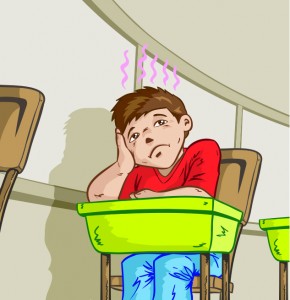By Mike Cohen, Director
Center for Brain
 Here’s a bold statement that might surprise you.
Here’s a bold statement that might surprise you.
Not every child who fidgets, has trouble paying attention or struggles in school has ADHD. In fact, 50 percent of children wearing this label also have a learning disability that might have been overlooked – something I see regularly in my practice.
This incomplete diagnosis is why many children on medications do poorly academically, despite being intelligent and even seeming calmer in school. Many attention problems are a byproduct of learning issues that frustrate the child and cause them to act out or have trouble staying focused.
Just because your child responds positively to stimulant medication doesn’t mean an ADHD diagnosis is correct. Stimulant medications improve focus for just about anyone – even people without ADHD. However, medications can’t overcome processing and learning issues – and they don’t teach your child how to pay better attention.
No parent wants to medicate a child unnecessarily, so what’s a parent to do? How can you find out what’s really going on?
At Center for Brain we have a way to help answer the question and put an end to the guessing game: Does my child really have ADHD – or is there something else going on?
Step One: The Brain Map
We first conduct a brain map, called a Connectivity Map, at our Jupiter office, created from a specialized EEG. The raw data are processed for a report which we review in depth with the parents.
We can tell from this map if the child truly has ADHD, has a learning disability, has some of both or none of these, making it possible to target treatment, where indicated. The map identifies specific areas of the brain that are poorly connected or poorly organized and are likely to be impacting the child’s ability to process information.
(Parents of our clients frequently exclaim that this report describes their child’s behaviors and struggles perfectly).
Step Two: Once we’ve learned from the map the cause of the attention, behavior or learning problem, we customize an advanced neurofeedback program to train their brain.
Remember that academic problems are brain issues, not a lack of desire or ability in the child to do well.
Neurofeedback technology is used to promote changes in the way neurons in the brain fire. A new type of neurofeedback called MCT (multivariate coherence training) is even more effective than traditional neurofeedback. MCT was co-developed by Dr. Robert Coben*. It hyper-targets and gently encourages those connections to improve, often doing so surprisingly fast.
Step 2 involves 15 sessions of MCT neurofeedback training, typically two or three sessions per week, targeted to the specific brain connectivity issues identified from analysis of the brain map.
Step Three: Re-evaluate changes, assess progress
After 15 neurofeedback sessions, we conduct a second brain map to see where physical changes have occurred and to summarize parent feedback. We identify areas, if any, that may need additional training.
Why this System Works
Research shows that there must be functional connections between key areas of the brain in order for attention and learning to take place easily. Without them, certain subject areas – and school in general – become a nightmare and an enormous frustration for the child.
Malfunctioning connections can result in issues with attention, dyslexia and other reading problems, dyscalculia (difficulty with math) and/or processing problems. Furthermore, the resulting frustration can often look like ADHD.
In one study, children treated twice a week for 20 sessions with individually-tailored neurofeedback based on a Connectivity Map enhanced their reading scores an average of 1.2 grade levels! The control group showed no improvement.
We know you have a lot of questions. That’s why we offer a free, no-obligation consultation.
Once we meet you and your child and understand your situation better, we can discuss if this new technology is a good treatment option. At the very least, with a Connectivity Map you’ll have a much clearer idea of what’s really happening with your child.
To learn more or to book an appointment, call us at (561)744-7616.
About Center for Brain
Center for Brain is staffed by a team of compassionate professionals whose mission is to enhance the lives of people suffering from a variety of conditions that can be significantly improved with the help of neurofeedback and other brain technologies.
SUCCESS STORIES
A 13-year-old boy who had been diagnosed with ADHD began doing his homework by himself – and without reminders – after undergoing 15 sessions of MCT neurofeedback. He had required one-on-one homework assistance for years from his mother.
A 12-year-old girl who had never been able to do math, struggled with writing, and who suffered from chronic headaches, began thinking up ideas more easily for writing assignments after five sessions. Two sessions later she earned the highest math grade in her academic history. Her headaches significantly decreased and her energy increased.
One 8-year-old girl with attention problems and severe learning disabilities had a severe dislike for math and reading. After seven sessions she started doing math for fun. After 10 sessions she began reading for pleasure. Her mother even discovered her in bed one night with a flashlight reading under the covers!
Michael Cohen, Director
Center for Brain
Mike is one of the leading experts in brain biofeedback. For more than 20 years he has helped children and adults feel better who suffer with a wide range of problems including ADHD, anxiety, insomnia, and learning and processing issues. He has taught neurofeedback to over 2,000 healthcare professionals, including medical doctors, all over the U.S. and the world.
*Robert Coben, Ph.D., developer of the application of the Connectivity Map to learning and processing issues, as well as the application of MCT neurofeedback for it, is Director and Chief Neuropsychologist of NeuroRehabilitation and Neuropsychological Services at Integrated Neuroscience Services in Fayetteville, Arkansas. He is an affiliated researcher of New York University Medical Center.
Center for Brain
is located at:
550 Heritage Drive, Suite 140
Jupiter, FL 33458
561.744.7616
www.CenterforBrain.com
Check Also
RejuvaNATION MedSpa: Elevating Men’s Health to New Heights
Embark on a Journey to Revitalize Your Vitality Rediscover the joy of a spontaneous sex …
 South Florida Health and Wellness Magazine Health and Wellness Articles
South Florida Health and Wellness Magazine Health and Wellness Articles




